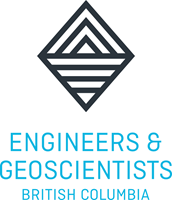Professional Geoscientist Registration
Geoscience is a regulated profession in Canada. This means that those planning on working as a geoscientist in Canada must either:
- be registered as a Professional Geoscientist (P.Geo.) in the province or territory where the work will take place; or
- work under the direct supervision of someone who is registered as a P.Geo. in the province or territory where the work will take place
| In British Columbia, the Engineers and Geoscientists British Columbia (EGBC) regulates and governs the geoscience profession under the authority of the Professional Governance Act*. The association is charged with protecting the public interest by setting and maintaining high academic, experience, and professional practice standards for all 40,000 registrants. Individuals licensed by EGBC are the only persons permitted by law to undertake and assume responsibility for engineering and geoscience projects in BC, and is linked to other provincial and territorial associations through Geoscientists Canada. |  |
| *This replaced the Engineers and Geoscientists Act in February 2021. | |
In addition to non-academic requirements (e.g., geoscience practice experience), P. Geo. applicants are required to have the equivalent of graduation from a four-year, full-time bachelor of science program and meet certain syllabus requirements depending on the discipline (Geology, Environmental Geoscience or Geophysics) in which they plan on practicing. Currently, students taking select courses (either required or elective) specified in SEOS' Earth Sciences and Combined Geography and Earth & Ocean Sciences programs described in the UVic Calendar can meet the syllabus requirements of the Geology and Environmental Geoscience disciplines, respectively. It is important, however, that students carefully plan their program (preferably starting in their second year) with EGBC syllabus requirements in mind.
2011 (Current) Syllabi:
As of January 1st, 2011, APEGBC has adopted national Geoscience Knowledge & Experience (or GKE) requirements for Professional Registration in Canada. The knowledge requirements are set out by discipline into five groups from which a total of 27 Educational Units (EU's - equivalent to a one semester course) must be completed. Course equivalent lists specific to UVic for both the Geology and Environmental Geoscience designations can be found by clicking on the associated link. A similar list pertaining to the Geophysics designation is not available at this time.
Additional information regarding professional registration are summarized in this presentation.
